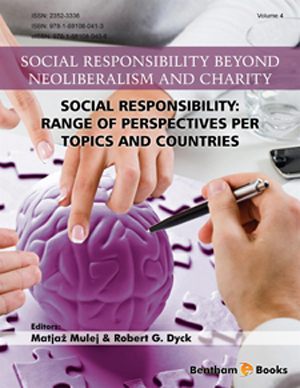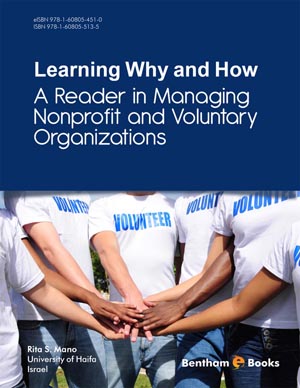List of Contributors
Page: vii-vii (1)
Author: Matjaž Mulej and Robert G. Dyck
DOI: 10.2174/9781681080406115040003
Responsible Corporate Management and Community Involvement
Page: 3-32 (30)
Author: Štefka Gorenak
DOI: 10.2174/9781681080406115040004
PDF Price: $15
Abstract
For at least five decades, scholars of Corporate Social Responsibility (CSR) have attempted to find and develop a constructive relationship between business and society. Corporate ethics implies a critical assessment of discourses and practices in organizations. This contribution reports about the importance of CSR, total quality management (TQM) and total responsibility management (TRM), as well as corporate citizenship. TRM principles and standards reflect rising public expectations about CSR. Many companies develop TRM requisitely holistically, and hence successfully manage their responsibilities toward their stakeholders and their natural environment. The evolution and implementation of TRM in business practice include vision, integration innovation and sustainable indicators according the ISO 26000. TRM indicators focus on stakeholders, together with the triple-bottom-lines of economic, social and environment issues measured in terms of cost-benefit. The concept of corporate citizenship is closely linked with CSR in terms of social and environmental issues. The top ten corporate values (integrity, honesty, justice, equality, objectivity, loyalty, devotion, respect, prudence, tolerance) are what one may generally observe expressed in most corporate codes of ethics. Ethical leadership is a kind of leadership by which one can create the social, political, economic, cultural conditions required for living together. Morally proactive leadership is critical for successful responsible management and corporate citizenship. The proactive companies focus on the importance of CSR and its management, inside and outside the global company. The Gorenje Group has included the proactive and innovative TRM as well as corporate citizenship into corporate strategy. These activities are transparent and represent the holistic and systemic responsible stakeholder management at the corporate level. Introduction of requisitely holistic TRM may hence be a management innovation toward CSR and success.
Social Responsibility and the Rule of Law
Page: 33-47 (15)
Author: Breda Mulec
DOI: 10.2174/9781681080406115040005
PDF Price: $15
Abstract
The author refers to the current political situation in Slovenia and tries to answer which players behave in a socially irresponsible way and hereby contribute to the overall political and social crises. The rule of law includes similar components as a socially responsible activity, for example: different levels of integrity, which will be specifically addressed in the second subchapter. In the third subchapter we will address the lack of interaction of different levels of integrity and some examples of social irresponsibility, in order to confirm or reject hypothesis about the close connection between social responsibility and the rule of law, with a higher percentage of social responsibility’s actions.
Well-Being as the Basic Aim of Social Responsibility
Page: 49-76 (28)
Author: Simona Šarotar Žižek
DOI: 10.2174/9781681080406115040006
PDF Price: $15
Abstract
The contemporary world is full of innovations, causing both good and bad consequences, including different outcomes of well-being. Most well-being problems cannot be resolved with the usual management and/or economic theories and practices that have caused these problems. Therefore, the question is raised: what could be done about the well-being of co-workers, if principles and measures of social responsibility were used? The well-being of individuals, employees, and society can result from technological and non-technological innovations (including honest behavior, care, and an end of abuses by managers in their treatment of employees, business partners, the broader society, and the natural preconditions of humankind’s survival), much more easily than without them. This is significant because people who enjoy well-being feel and work better, thus contributing to requisite holism and success. In this chapter the author presents strategies for enabling the well-being of co-workers in organizations.
First Responders in Regional Disasters: A Case of Social Responsibility
Page: 77-104 (28)
Author: Gerhard Chroust, Günther Ossimitz, Markus Roth, Nadine Sturm and Peter Ziehesberger
DOI: 10.2174/9781681080406115040007
PDF Price: $15
Abstract
Today’s disasters, many of them man-made or at least triggered by human activity, endanger an increasing number of humans in large geographic areas in numerous different ways, calling for more attention concerning appropriate reactions. We discuss what constitutes a “disaster” and analyze different response types (including Flight/Run Away, Fight/Intervene, Freeze, Submit/Sustain/Endure, and Ignore/Deny). Concentrating on the classical Fight/Intervene response, we investigate several alternative ways to view interventions: systemic (bringing a system, i.e. the object under danger, back to its domain of viability), process-oriented (characterizing an intervention as a set of interlinked process steps), organizational (identifying systemic strategies and tactics), and human (considering Social Responsibility, psychological problems, mental health, and multicultural aspects). We will also identify the role that modern Information and Communication Technology can play in supporting First Responders by making their job easier and at the same time more effective.
Requisite Holism of Behavior When Facing Complexity of Pandemic Diseases – New Trends in Healthcare Information System (HIS)
Page: 105-161 (57)
Author: Teodora Ivanuša, Matjaž Mulej, Iztok Podbregar and Bojan Rosi
DOI: 10.2174/9781681080406115040008
PDF Price: $15
Abstract
The essence of neoliberalism is one-sidedness that might be resolved by market, if the latter worked. A pandemic is a case of consequences of this over-simplified supposition. It is a difficult event for many; hence it requires social responsibility on the individual, organizational, and societal levels. It is also sufficiently complex and nonroutine occurrence that it allows for no successful consideration with one-sided and routine-based approaches, which may have been successful sometimes. It is useful to gather all available experience from previous cases, and use them to make indicative, but only indicative reminders, and to complement them with insights on the new individual, group-specific and perhaps also general parts of the considered pandemic characteristics.
Thus gradually useful-enough reminders would arise that are both sufficiently reliable (in the general part) and sufficiently flexible (in the group-specific and even more so in the individual part) of attributes. How useful will such reminders be, depends on the situation and even more on subjective basic premises of the authors, and users of reminders as check-lists for users’ actions. Whoever does not conform to them at all can exaggerate to the detriment of people, similarly as those who would obey reminders rigidly without any proper creativity or even innovation. The overview of emergency measures, we have summarized, can serve as a reminder for a requisitely holistic action at eventual pandemic, for nothing unpleasant to surprise us.Innovation of Managerial Attributes to Incorporate a More Systemic World-View
Page: 163-195 (33)
Author: Matjaž Mulej, Tatiana A. Medvedeva, Vojko Potočan, Zdenka Ženko, Simona Šarotar Žižek, Anita Hrast and Tjaša Štrukelj
DOI: 10.2174/9781681080406115040009
PDF Price: $15
Abstract
To get to the root of socio-economic problems, the responsible leadership must be positively influenced. Innovation of managerial attributes is usually necessary, requiring a shift to a more systemic world-view. Our empirical research describes the situation. Education of future managers by new methods is discussed. This chapter elaborates the related short subchapter in Mulej et al.’s introductory chapter.
The Economic and Environmental Decline of Atenquique, Mexico, Associated with Socially Irresponsible Corporate Ownership
Page: 197-220 (24)
Author: José G. Vargas-Hernández
DOI: 10.2174/9781681080406115040010
PDF Price: $15
Abstract
This chapter analyzes the development process of Atenquique, a town now under corporate ownership, showing how corporate changes have affected the livelihood and welfare of its inhabitants. The chapter reports about the consequences of the privatization of the Paper Mill Company that used to belong to the state; it affected environmental conditions and caused economic decline in Atenquique. The ownership change resulted from globalization that took place after the very successful years of the paper mills after 1950s. This chapter reports about the quality of life of the labor force of this Paper Mill Company under the impact of globalization, and workers’ feelings about the new corporate owners. We applied descriptive and exploratory methodology. The Industrial Company of Atenquique was growing, while it was owned by the Mexican State. After the company had become private property, the town was declining and lost population and economic output, and this decline also affected the regional surrounding population.
Socially Responsible Business in the “BRICS” Economies: The Way to a Sustainable Future
Page: 221-240 (20)
Author: Zhanna S. Belyaeva and Alberto G. Canen
DOI: 10.2174/9781681080406115040011
PDF Price: $15
Abstract
This contribution provides general background concerning the practices of corporate social responsibility in the ‘BRICS’ countries (Brazil, Russia, India, China, South Africa). It discusses the problems that interfere with raising the effectiveness of social responsibility-based behavior, with reference to economic productivity.
It also attempts to describe the existing organizational structures, as related to the need to support socially responsible business practices. In contrast to current analysis of BRICS’s economic success, the research outlines certain activities needed to overcome identified negative consequences of current practices. It also attempts to forecast results of more universal application of CSR, suggesting how the BRICS would rank in the world map of CSR.Subject Index
Page: 241-242 (2)
Author: Matjaž Mulej and Robert G. Dyck
DOI: 10.2174/9781681080406115040012
Introduction
Current global economic crises call for social responsibility to replace neo-liberalistic, one-sided and short-term criteria causing monopolies of global enterprises. Humanity’s existence is endangered under the threat of global capitalism, unless the positive concept ‘everyone’s social responsibility impacts everyone in society’ becomes the basis of the new socio-economic order. This concept must be realized together with related concepts of ‘interdependence’ and ‘holism,’ embodying the principles of accountability, transparency, ethical behavior, and respect for stakeholders--to support the rule of law, international norms, and human rights. Range of Perspectives Per Topics and Countries brings forth discussions from researchers from different countries. The contents of this volume include discussions related to community involvement, disaster response and disease epidemics, among other topics. The volume also includes studies on social responsibility standards in a Mexican city as well as a discussion of social responsibility in BIRCS countries.










.jpg)

